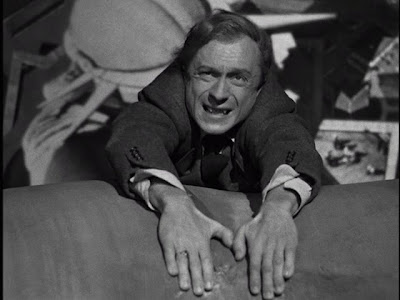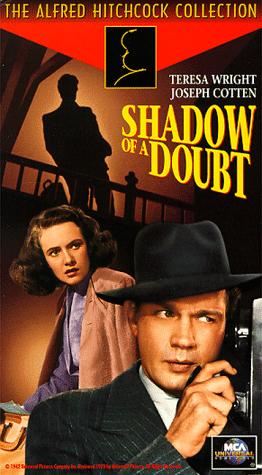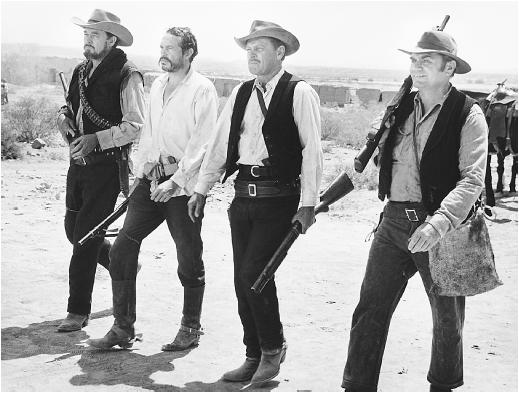An Early 1940s Hitch Film Fest:
Saboteur (Alfred Hitchcock, 1942)

Hitch takes his man-on-the-run plot from
The 39 Steps and adapts it to WWII America and basically develops the blueprint for his later
North by Northwest. This time, Robert Cummings is the innocent accused of sabotage and murder, but he knows there's another man who did what he's accused of doing, so he goes cross country from Los Angeles to New York to try to find this man. Along the way, he's captured by the "bad guys" and the authorities and is forced to escape several times. He also hooks up with a young woman (Priscilla Lane) who initially despises him but then falls for him and does all she can to help him prove his innocenece. The film is a little creaky here and there but delivers the goods in many of the set-pieces including the opening fire, a scene at the ranch of the main villain (Otto Kruger), a getaway at a bridge, the explosion of an ocean liner, a scene in a movie theatre showing a comedy-thriller, and of course, the conclusion at the Statue of Liberty. Norman Lloyd, another one of the baddies, was born to play a vampire. Just look at his mouth hanging from the Statue.
 Shadow of a Doubt
Shadow of a Doubt (Alfred Hitchcock, 1943)

Hitchcock paints a beautiful picture of Americana in the town of Santa Rosa. Everybody seems happy and everything is in its right place. What's even more perfect is that young Charlie (Teresa Wright) has just learned that her favorite person in the world, her Uncle Charlie (Joseph Cotten) is coming to visit the family. Young Charlie's world is wonderful when her uncle shows up, but soon it seems that Uncle Charlie is acting secretively and two detectives show up asking questions about him. Could Uncle Charlie really be the Merry Widow Murderer or is it that other suspect back east? Young Charlie's world is thrown into turmoil as she has to investigate for herself whether her uncle is still her favorite person or a vicious killer who needs to be turned in. I personally think that what Hitch does here is something similar to what David Lynch was trying to do in
Blue Velvet; he shows the dark underbelly of the American Dream. Hitch is quite successful at probing the dichotomy cinematically while I believe that Lynch goes off the deep end using cartoonish grotesquerie. Sorry about that, but that's the way I see the two films.
 Foreign Correspondent
Foreign Correspondent (Alfred Hitchcock, 1940)

Hitchcock's second film nominated Best Picture of 1940 (the other is coming next) is a witty, exciting tale of an American reporter (Joel McCrea) "turned into" a foreign correspondent who travels to Europe to find out what's going on just before the outbreak of WWII. He finds there are plenty of sinister happenings, including "two versions of the same man" (Albert Bassermann), a humanitarian (Herbert Marshall) who turns out to be a fascist puppet, the latter's attractive daughter (Laraine Day) who wants nothing to do with the reporter, and a British reporter (George Sanders) also investigating the proceedings. Hitch doesn't stint on terrific set-pieces including the scene on the steps during the rain with dozens of open umbrellas, that suspicious windmill which seems to be turning in the wrong direction, and a super-duper plane crash into the ocean. It's Hitchcock at his most personally-fiendish.
Rebecca (Alfred Hitchcock, 1940)

This is Hitch's only film to win a Best Picture Oscar, but no, he didn't win best director (he never did). This is a David O. Selznick production, and it seems more like a Selznick film than a Hitchcock one. It's got terrific storytelling, wonderful acting and a sumptuous production. Hitchcock does imbue the film with mystery and suspense, but it seems to be more of a professional job and less of a personal undertaking to get at the audience, which, after all, is basically why Hitchcock films are so appealing. Even if Hitch seems a little bit hamstrung by being a team player here, the plot is so ingenious and the characters so interesting that it's definitely a must-see and probably the best film Hitch made during the 1940s (and yes, I realize many feel that film should be
Notorious, but feel free to keep that opinion if it's yours

). I don't know if I want to spoil it too much, but basically wealthy widower Laurence Olivier meets and eventually marries a simple young woman (Joan Fontaine), and later he takes her to his enormous estate Manderley where the overwhelming presence of his dead wife Rebecca threatens to shatter their marriage. To make things even more frightful, Rebecca's devoted housekeeper (Judith Anderson) goes out of her way to tell the new wife that she can never compare in any way to Rebecca. The strength of the film is that things are never actually quite what they appear to be, almost right to the very end.





















